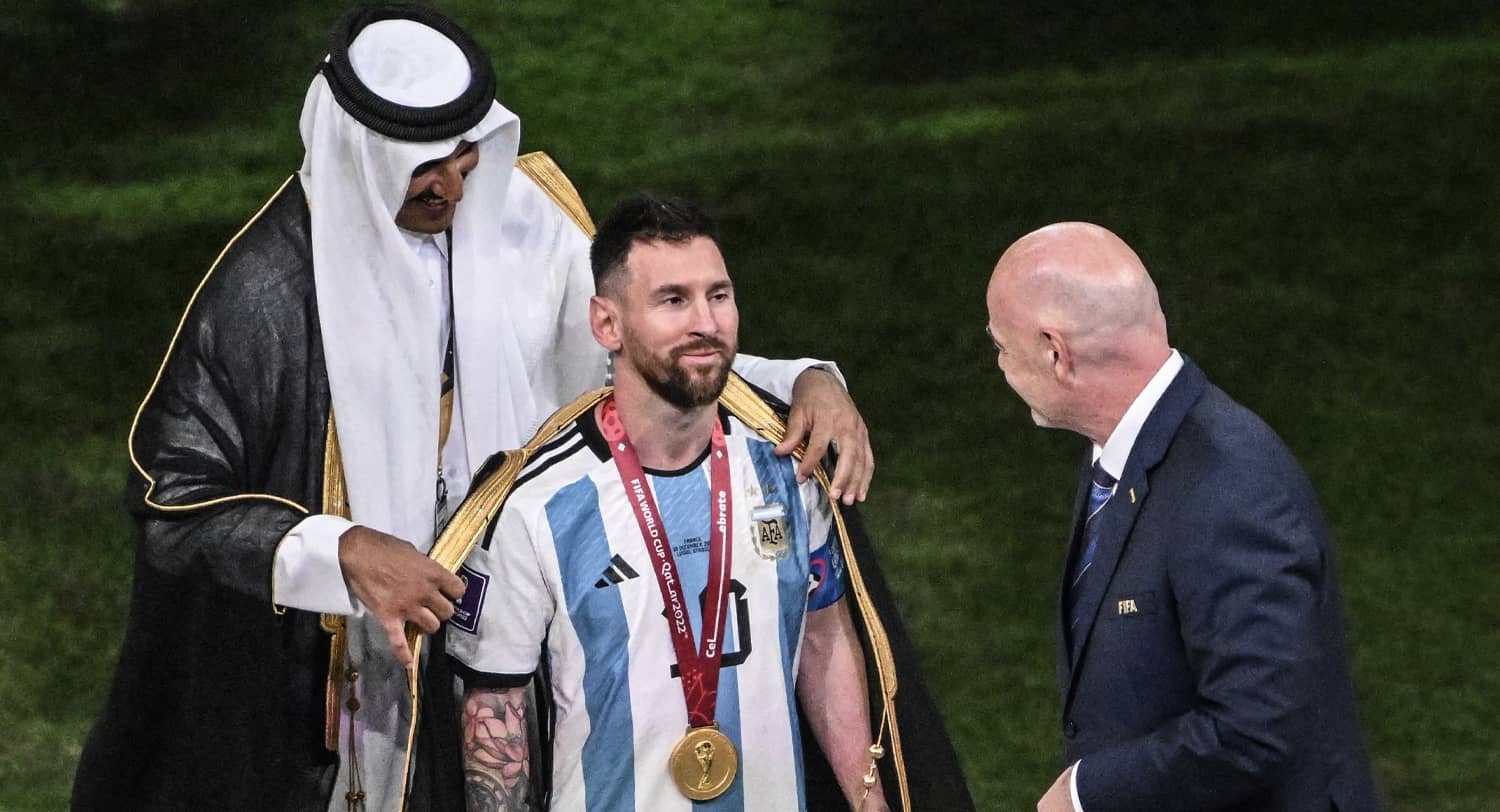Few events in history have been watched live by more people around the world than the final match of the World Cup soccer tournament in Qatar on December 18, 2022. After a riveting game, it was the legendary leader of the Argentinian team—Lionel Messi—who lifted the golden trophy. Right then, as hundreds of millions were watching, he was adorned by his Qatari host—the Emir Sheikh Tamim bin Hamad al-Thani—with a traditional cloak, called a “bisht,” over his shoulders.
To the Qataris, this was just their cultural way of honoring him—similar to Pelé’s donning a sombrero at Mexico’s World Cup finals or Olympic champions being given an olive wreath in Athens Summer Games. But to their detractors, this was one more demonstration of the manner in which the Qataris used the most popular sport in the world in pursuit of their own political agenda.
Why would a tiny country with no soccer tradition, even one as rich as Qatar, invest huge sums of money—just short of a quarter of a trillion dollars overall—to build the infrastructure and organize the event? And to this can be added the sums paid to European leagues to forego their own games in winter (because the tournament could not be held in the Qatari climate during the summer, the usual time for these events), and, sadly, the lives of foreign workers who lost their lives while building the impressive stadiums and other infrastructure projects.
Beyond the sheer ostentation, what drove this effort? In the previous decade, the Qatari ruling family found itself under siege. For ideological and strategic reasons, alongside deep-set personal and familial rivalries, the Qataris (and their resident tv station, Al Jazeera) took the side of Morsi’s Muslim Brotherhood in Egypt, and of Erdoğan’s Turkey, in the turbulent politics of the Arab Spring Their neighbors in the Gulf, led by Saudi Arabia and the Emirates, sided with Egypt’s el-Sisi and the forces of regional stability. Qatar, in consequence, found itself isolated and besieged.
A formal reconciliation was negotiated by Jared Kushner in 2020; the US has a vested interest in Qatar, which hosts the largest American military base in the region and was recognized by the Biden administration as a major non-NATO ally. As an act of solidarity with his powerful neighbor, Sheikh Tamim even publicly donned the Saudi colors when the Saudis actually beat Argentina in a stunning reversal in the early stages of the tournament. But the underlying rivalries still linger, and Qatar, among other hydro-carbon states, often finances displays of its influence. The World Cup was simply the most public and international of its kind.
This brings us to the Israeli angle. FIFA (Federation Internationale de Football Association) would not have allowed Qatar to host the games if the citizens of any nation, including Israel, would have been prevented from attending. Hence, special provisions were made—in the absence of diplomatic relations—for Israeli soccer fans to fly in directly, for a consular office to be activated in Doha, and for Israelis to roam freely—as well as for Israeli media teams to provide full coverage. There were no incidents of violence involving the thousands of Israeli citizens who did come to Qatar to watch the games.
The Qataris, however, were keen to ensure that none of this would be misread as a sign of normalization, of the kind that has been taking place these last two years between Israel and two of their neighbors, the United Arab Emirates and Bahrain. All arrangements were limited to the duration of the games and terminated forthwith after they ended.
The Qatari authorities generally prevented the flying of flags and political banners, apparently worried about the protest movement in Iran spilling over into their streets. This was not the case, however, when it came to Palestinian flags and slogans that were prominently displayed, occasionally by the participating teams themselves. Israel journalists, while not physically molested, were subject to ridicule and verbal abuse. The scenes, as reported in the Israeli media, left a scar in public perceptions here, playing into the hands of those who hold out a rejectionist position toward any prospects of peace.
It is difficult to determine how much of this display of anti-Israel hostility was spontaneous and authentic and how much of it was organized and encouraged by the Qatari government. The president of the Palestinian Authority, Mahmoud Abbas, was in the latter camp, publicly thanking the emir of Qatar for pushing the Palestinian cause. Israeli journalists on the ground in Doha told their audiences in Israel that both factors were at play and that Israel has a lot of work to do to overcome decades of anti-Israel indoctrination in the Arab countries.
One ray of light was the overt Israeli sympathy toward the Moroccan team, the “Lions of the Atlas.” They turned out to be the “Cinderella” of the tournament, reaching the semifinals. The Moroccan team also displayed the Palestinian flag, but this did not prevent Israelis from all backgrounds—not just the million Israelis of Moroccan origin—from cheering them on as they challenged (and defeated) far more famous European teams such as Spain and Portugal. With Morocco doing well, and with Croatia—a nation less than half the size of Israel in population—ending third, a country like Israel, where soccer remains the most popular sport, can nurture its own dreams.



